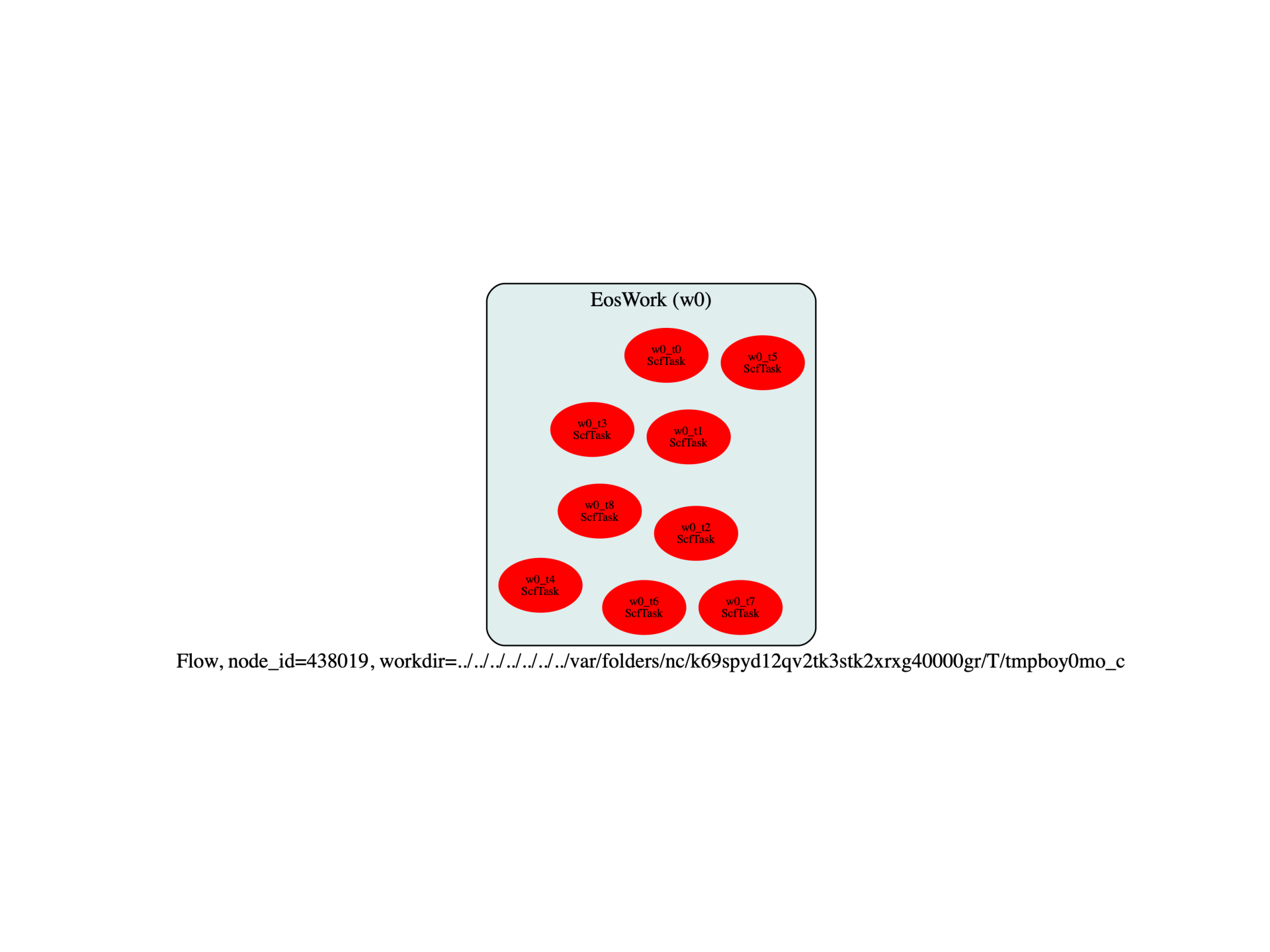Note
Go to the end to download the full example code.
Equation of state
Flow to compute the equation of state by fitting E(V) at T = 0.
import sys
import os
import abipy.data as abidata
import abipy.abilab as abilab
import abipy.flowtk as flowtk
def build_flow(options):
# Set working directory (default is the name of the script with '.py' removed and "run_" replaced by "flow_")
if not options.workdir:
options.workdir = os.path.basename(sys.argv[0]).replace(".py", "").replace("run_", "flow_")
# Build GS input file.
pseudos = abidata.pseudos("Si.GGA_PBE-JTH-paw.xml")
#silicon = abilab.Structure.zincblende(5.431, ["Si", "Si"], units="ang")
silicon = abidata.cif_file("si.cif")
scf_input = abilab.AbinitInput(silicon, pseudos)
ecut = 12
scf_input.set_vars(
ecut=ecut,
pawecutdg=40,
nband=6,
paral_kgb=0,
iomode=3,
toldfe=1e-9,
)
# K-point sampling (shifted)
scf_input.set_autokmesh(nksmall=4)
from abipy.flowtk.gs_works import EosWork
flow = flowtk.Flow(options.workdir, manager=options.manager)
# Si is cubic and atomic positions are fixed by symmetry so we
# use move_atoms=False to compute E(V) with GS-SCF tasks instead of
# performing a constant-volume optimization of the cell geometry.
work = EosWork.from_scf_input(scf_input, move_atoms=False, ecutsm=0.5)
flow.register_work(work)
flow.allocate(use_smartio=True)
return flow
# This block generates the thumbnails in the AbiPy gallery.
# You can safely REMOVE this part if you are using this script for production runs.
if os.getenv("READTHEDOCS", False):
__name__ = None
import tempfile
options = flowtk.build_flow_main_parser().parse_args(["-w", tempfile.mkdtemp()])
build_flow(options).graphviz_imshow()
@flowtk.flow_main
def main(options):
"""
This is our main function that will be invoked by the script.
flow_main is a decorator implementing the command line interface.
Command line args are stored in `options`.
"""
return build_flow(options)
if __name__ == "__main__":
sys.exit(main())

Input does not define ecutsm input variable.
A default value of 0.5 will be added to all the EOS inputs
Run the script with:
run_eos.py -s
then use:
abirun.py flow_eos structures
to get info about the initial and final structures.
Lattice parameters:
formula natom angle0 angle1 angle2 a b c volume \
w0_t0_in Si2 2 60.0 60.0 60.0 3.854 3.854 3.854 40.479
w0_t0_out Si2 2 60.0 60.0 60.0 3.854 3.854 3.854 40.479
w0_t1_in Si2 2 60.0 60.0 60.0 3.857 3.857 3.857 40.582
w0_t1_out Si2 2 60.0 60.0 60.0 3.857 3.857 3.857 40.582
w0_t2_in Si2 2 60.0 60.0 60.0 3.861 3.861 3.861 40.684
w0_t2_out Si2 2 60.0 60.0 60.0 3.861 3.861 3.861 40.684
w0_t3_in Si2 2 60.0 60.0 60.0 3.864 3.864 3.864 40.786
w0_t3_out Si2 2 60.0 60.0 60.0 3.864 3.864 3.864 40.786
w0_t4_in Si2 2 60.0 60.0 60.0 3.867 3.867 3.867 40.888
w0_t4_out Si2 2 60.0 60.0 60.0 3.867 3.867 3.867 40.888
w0_t5_in Si2 2 60.0 60.0 60.0 3.870 3.870 3.870 40.991
w0_t5_out Si2 2 60.0 60.0 60.0 3.870 3.870 3.870 40.991
w0_t6_in Si2 2 60.0 60.0 60.0 3.873 3.873 3.873 41.093
w0_t6_out Si2 2 60.0 60.0 60.0 3.873 3.873 3.873 41.093
w0_t7_in Si2 2 60.0 60.0 60.0 3.877 3.877 3.877 41.195
w0_t7_out Si2 2 60.0 60.0 60.0 3.877 3.877 3.877 41.195
w0_t8_in Si2 2 60.0 60.0 60.0 3.880 3.880 3.880 41.297
w0_t8_out Si2 2 60.0 60.0 60.0 3.880 3.880 3.880 41.297
abispg_num P [GPa] Max|F| eV/ang task_class status
w0_t0_in None NaN NaN ScfTask Completed
w0_t0_out 227 1.327 9.506e-28 ScfTask Completed
w0_t1_in None NaN NaN ScfTask Completed
w0_t1_out 227 1.092 1.877e-27 ScfTask Completed
w0_t2_in None NaN NaN ScfTask Completed
w0_t2_out 227 0.859 4.649e-27 ScfTask Completed
w0_t3_in None NaN NaN ScfTask Completed
w0_t3_out 227 0.629 5.062e-27 ScfTask Completed
w0_t4_in None NaN NaN ScfTask Completed
w0_t4_out 227 0.403 5.945e-27 ScfTask Completed
w0_t5_in None NaN NaN ScfTask Completed
w0_t5_out 227 0.178 6.306e-27 ScfTask Completed
w0_t6_in None NaN NaN ScfTask Completed
w0_t6_out 227 -0.042 1.738e-27 ScfTask Completed
w0_t7_in None NaN NaN ScfTask Completed
w0_t7_out 227 -0.259 2.725e-27 ScfTask Completed
w0_t8_in None NaN NaN ScfTask Completed
w0_t8_out 227 -0.474 6.939e-27 ScfTask Completed
Use `--verbose` to print atoms.
Silicon is a cubic materials and the positions are fixed by symmeetry so we only need ScfTask to get E(V).
The EOS results are saved in the JSON file in flow_eos/w0/outdata/eos_data.json.
We can also use the GSR robot to compute and plot the EOS.
Use
abirun.py flow_eos robot GSR
to build a robot for GSR files and start an ipython shell. Then, inside ipython, type:
In [1]: %matplotlib
In [2]: robot.gridplot_eos()
to produce

Total running time of the script: (0 minutes 0.522 seconds)